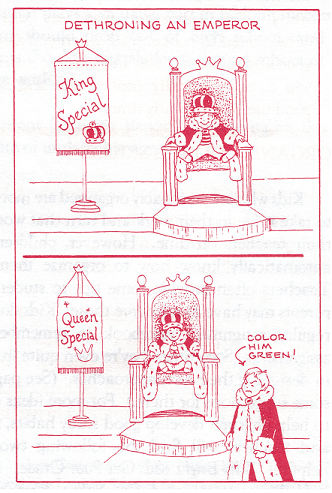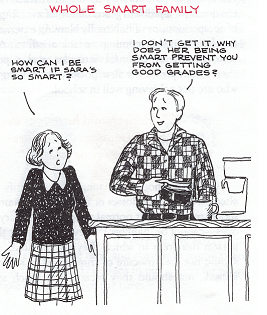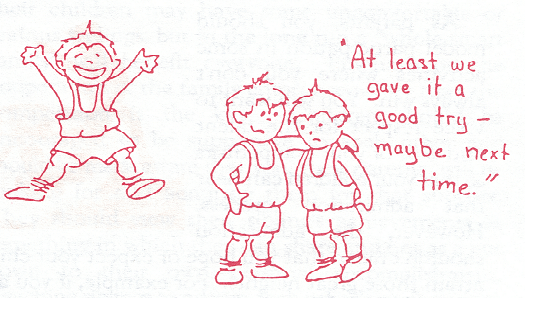LEARNING TO COPE COMPETITION IN THE FAMILY The hardest kind of competition to cope with is within the family. When another sibling is born or the parent remarries, the child may feel irrationally and extraordinarily jealous, although he knows he should be happy about the new member of the family. I call this concept “dethronement.” Dethroned children typically exhibit negativity, anger, or sadness. Their personalities may change so dramatically that parents, teachers, and even doctors may assume they’re undergoing clinical depression. Some comments from parents about dethroned children follow:
“Emphasis on the cooperation of COMPETITION IN LIFE Some children live in highly competitive families. They may As parents, you should model participation in some activities where you don't always win. You will want to voice respect for the talent and skill of your competitors so that your children can hear that admiration process. However, the admiration shouldn't mean that you hope or expect your “You are building unlikely Parents frequently tell their children they can do anything if they're willing to work hard enough. Although it's true enough that practice enhances skill, your children, despite all efforts, may not make it to Olympic sports, the Metropolitan Opera, Harvard Medical School, the Broadway stage, the National Ballet, the Cleveland Indians, or the Green Bay Packers. Although these expectations are usually delivered in jest, children often take them seriously. Some children may begin their efforts immediately and may assume that if they're stars of the sixth grade basketball team, they're on the way to professional basketball. They practice basketball earnestly, but schoolwork seems undeserving of a similar commitment. Learning to work in arenas where they are not stars is an essential component of learning to function effectively in a competitive society. COMPETITION IN SCHOOL The ability to function in competition is central to achievement. Underachievers have not learned the techniques of competing. Although they may win happily, they have not learned to recover after losses. They lose their tempers, sulk, quit, or avoid and don't take the risk of working unless they are certain to win. Parents should teach children how to cope with a competitive life-style because surviving in a competitive environment is synonymous with achieving. “Parents can teach their Parents can teach their children to be survivors. They can Other children take a more destructive path that leads to underachievement. With failure, they become failure-oriented. They come to view school as a competitive game in HEALTHY PROBLEM SOLVING To help their children cope with losses, parents should first examine their own competitive style; children may have learned maladaptive responses to failure at home. For example, parents may model an attitude of quitting too quickly if a problem gets difficult, of avoiding any type of competition, or of habitually blaming external sources for their own shortcomings or lack of effort. A possible restructuring of parental attitudes and expectations, therefore, may be the first priority for helping children who are not achieving well in school. “Children should be taught to Children should be taught to identify creative alternatives for their losses or failures. For example, they should recognize that normal people—even very talented ones—cannot be "Number 1 " in everything, but that every person has areas in which they are talented. Children should not feel insecure or threatened by an occasional setback, nor should they receive too much sympathy. Discussions of children's losses may need to wait until after the emotional tension is reduced in order to avoid their defensive responses. Parents cannot expect rational perception or logical thinking during the immediate stress period following an upsetting defeat. A questioning approach, rather than a lecture, may better help children understand that (1) they cannot always win, (2) disappointment does not mean they are failures, (3) the particular experience simply was not as successful as they had hoped it would be, (4) everyone would like to be smarter than they are, and especially, (5) the main goal is to play the learning game at their best performance level, regardless of their competitive ranking. Effort counts. *From Why Bright Kids Get Poor Grades, And What You Can Do About It (Rimm, Crown Publishing, 1995) ©2011 by Sylvia B. Rimm. All rights reserved. This publication, or parts thereof, may not be reproduced in any form without written permission of the author. |
©2010 by Sylvia B. Rimm. All rights reserved.
Report any problems with this site to Webmaster@sylviarimm.com

 Parents should explain that they understand that their children may have some uncomfortable or jealous feelings, but in the long run a "whole smart family" will benefit everyone. Emphasis on the cooperation of the family enterprise rather than the competition is the key. Children should be encouraged to be supportive to each other and should be made aware that you, their parents, will be looking for and admiring them for that support. They should view their sibling's achievements as something in which they can share and not as a put down to their own personal accomplishment. Teaching siblings to admire each other's performance is a valuable counterbalancing technique in dealing with children's difficult feelings of sibling rivalry.
Parents should explain that they understand that their children may have some uncomfortable or jealous feelings, but in the long run a "whole smart family" will benefit everyone. Emphasis on the cooperation of the family enterprise rather than the competition is the key. Children should be encouraged to be supportive to each other and should be made aware that you, their parents, will be looking for and admiring them for that support. They should view their sibling's achievements as something in which they can share and not as a put down to their own personal accomplishment. Teaching siblings to admire each other's performance is a valuable counterbalancing technique in dealing with children's difficult feelings of sibling rivalry. have found areas of activity in which they can be winners. They only need to put winning in perspective. They can value excellence as long as they don't feel valued only for their excellence. Parents' messages that "we like children who win, who are the smartest, and who excel," should be changed to "we like children who try, who are responsible, and who make positive and sincere effort." If it feels to children as though they have to perform "best" to earn their parents' love and attention, they will only select areas of participation in which they are convinced they can excel.
have found areas of activity in which they can be winners. They only need to put winning in perspective. They can value excellence as long as they don't feel valued only for their excellence. Parents' messages that "we like children who win, who are the smartest, and who excel," should be changed to "we like children who try, who are responsible, and who make positive and sincere effort." If it feels to children as though they have to perform "best" to earn their parents' love and attention, they will only select areas of participation in which they are convinced they can excel. children to attain those great heights. For example, if you and your son play tennis and you're watching the Wimbledon tennis championships, explain to him how to observe the players and learn from their skills, but please don't suggest, as so many parents do, that if he practices regularly, he may be playing tennis at Wimbledon some day. You are building unlikely dreams and unreasonable competitiveness. There will be time enough later for such lofty goals if he displays extraordinary talent. At this early date, competition with his friends is a reasonable standard to set for both fun and glory.
children to attain those great heights. For example, if you and your son play tennis and you're watching the Wimbledon tennis championships, explain to him how to observe the players and learn from their skills, but please don't suggest, as so many parents do, that if he practices regularly, he may be playing tennis at Wimbledon some day. You are building unlikely dreams and unreasonable competitiveness. There will be time enough later for such lofty goals if he displays extraordinary talent. At this early date, competition with his friends is a reasonable standard to set for both fun and glory.  learn to creatively view their failures and losses as learning experiences. When failure occurs, they identify the problems, remedy the deficiencies, reset their goals, and grow from the experiences. Failure is viewed only as a temporary setback, and they learn to attribute their failure to lack of effort, the unusual difficulty of a task, or perhaps the extraordinary skill of other competitors. As coping strategies, they may laugh at their errors, determine to work harder, and/or redesign their achievement goals. Most important, they see themselves as falling short of a goal, not falling short as people.
learn to creatively view their failures and losses as learning experiences. When failure occurs, they identify the problems, remedy the deficiencies, reset their goals, and grow from the experiences. Failure is viewed only as a temporary setback, and they learn to attribute their failure to lack of effort, the unusual difficulty of a task, or perhaps the extraordinary skill of other competitors. As coping strategies, they may laugh at their errors, determine to work harder, and/or redesign their achievement goals. Most important, they see themselves as falling short of a goal, not falling short as people.
 which they are incapable of winning, so they logically decide that there is little purpose in playing. They learn to give up easily and to get by with a minimum of effort. They see themselves as losers and decide the game isn't worth playing. The skill deficits increase, and these children become underachievers who have little or no confidence in their ability to successfully function in the school game.
which they are incapable of winning, so they logically decide that there is little purpose in playing. They learn to give up easily and to get by with a minimum of effort. They see themselves as losers and decide the game isn't worth playing. The skill deficits increase, and these children become underachievers who have little or no confidence in their ability to successfully function in the school game.